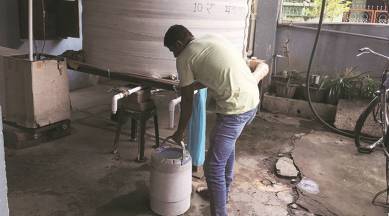Maharashtra elections: Clean water on voters’ mind in Bhandara, missing in poll campaign
Over the past five years, Bhandara has been pushed into using RO systems as the water in the Wainganga river, on whose banks it is situated, is highly polluted.

LOCAL RESIDENTS in Bhandara have a word for the water that, at times, flows through their taps during the monsoon ? ‘Coca Cola’. It is this unusable blackish fluid pumped through ageing pipelines that has fuelled an exponential demand for RO (reverse osmosis) water over the past four years.
Close to 30 private RO plants, selling 20-litre jars for Rs 5 and of those of cold water for Rs 25 to Rs 30, dot this city that has a population of a lakh.
monthly limit of free stories.
with an Express account.
Kiran Chopekar, who runs one such plant, says the capital investment is not daunting. His shop comprises two large tanks, one processing room temperature water and another cold, and a series of pipes, where residents line up with plastic jars. When the shop shuts at 9 pm, those in need of water simply slide Rs 5 coins into a water ATM fitted by the door.
Atul Algave, who runs a granite store at Nagpur Naka, says there is no option but to use treated water. “The water supplied by the municipal council is not fit to drink or bathe in. Before customers step into my shop, they always ask if I’ve got RO water inside,” he says.
Over the past five years, Bhandara has been pushed into using RO systems as the water in the Wainganga river, on whose banks it is situated, is highly polluted. Toxic industrial effluents and sewage flow down the Nag river in Nagpur, which then joins the Wainganga.
While the Nagpur Municipal Corporation (NMC) has proposed to undertake a massive clean-up operation for the Nag river, those living on the banks of the Wainganga in Bhandara, dependent on river water for irrigation, have long demanded a swift solution to the crisis.
A recent study by the National Environmental Engineering Research Institute (NEERI) has warned that river water should not be used unless it is treated with disinfectant. Local residents have seized the business opportunity provided by the demand for clean water and the aversion to tap water.
Each of Bhandara’s 33 administrative wards has at least three private RO plants, says Surender Makode. The 40-year-old, who runs four plants across the city, including one at home, says between 5 am and 7 am and 6 pm and 8 pm, there are long queues of people holding plastic jars outside each plant.
“In Bhandara, we are now so used to drinking RO water that we cannot drink any other kind. If we do, we immediately get a cold because our immune systems are unable to fight back,” he says.
The issue, however, has not been addressed by any of the candidates vying for the Bhandara Assembly seat. “No candidate has talked about resolving the issue. Had a water supply problem of this magnitude taken place in any other city in India, people would come out on the streets in protest,” says Makode.
The mushrooming of RO plants has resulted in a gradual dip in the groundwater level at Bhandara. The district administration, which now has to dig steadily deeper for borewells, admits that local supply could dry up unless those operating RO plants return excess water back into the ground.
The municipal council, for its part, has attempted to fix this problem by opening RO plants of its own in the wards, apart from setting up water treatment plants. Simultaneously, the council has also begun work to build new underground water pipelines to connect each property in the city.
“The existing water pipelines were built during the British rule and are now old and rotten. When a crack develops in any pipeline, the water mixes with the earth and contaminated water pours out of taps,” says Prashant Ganveer, Junior Engineer, Water Supply Department.
The council aims to finish building 163-km pipelines within the next year and a half and supply water treated with two levels of chlorination. Once the pipelines are laid, says Makode, the demand for RO water will fall. “The only market left for private RO plants will be supplying cold water in bulk at weddings and other events,” he adds.
Bhandara zilla parishad member Arvind Bhaladhare, who is contesting the Assembly election on a BJP ticket, says in every locality he has visited during the campaign, people have demanded a solution to the water crisis.
“People need to understand that a project of this scale takes time to execute. Work on building pipelines and water treatment plants is on,” he says.